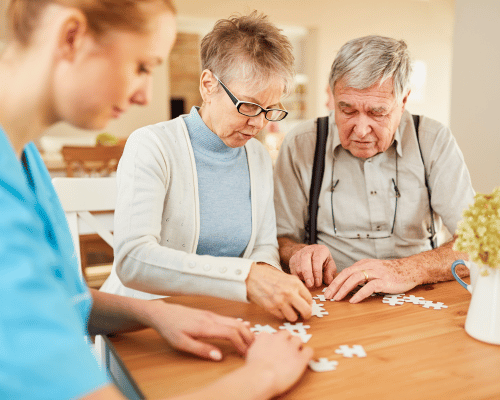Dementia affects millions worldwide, presenting a gradual decline in cognitive abilities. Memory loss is a particularly distressing symptom for individuals and their families. However, sensory activities offer hope. These methods have demonstrated the potential to slow cognitive decline and improve memory in those with dementia. Let’s delve into these sensory-based interventions.
Music has a distinct capability to stimulate areas of the brain that many other interventions might overlook. This power of music becomes especially evident in dementia patients who, despite facing difficulties with recent events, can often vividly remember and even vocalize songs from their younger days.

The sense of smell is intricately linked to memory more than any other sense. Specific scents can instantly prompt recollections, sometimes in vivid detail. In dementia patients, the power of aromatherapy can be particularly pronounced, drawing them back to cherished moments or familiar places.

The sense of touch plays an essential role in human connection, emotion, and memory. Engaging in tactile activities can offer therapeutic benefits, especially for dementia patients, who often respond positively to various textures and sensations.

Our eyes are gateways to the world, capturing moments and converting them into lasting memories. For dementia patients, visual cues can reignite emotions and memories that may seem dormant. Harnessing the power of visual stimulation can become a pivotal aspect of their care.

Taste buds often serve as a direct line to our past. Food forms an indelible part of our memory tapestry from childhood treats to celebratory feasts. For dementia patients, revisiting these flavors can be a heartwarming and memory-stirring experience.

Sound waves, be it the murmur of a brook or the rhythm of a story, can penetrate the deepest recesses of our memory. Dementia patients, in particular, can derive solace, stimulation, and memory recall from various auditory experiences.

Realizing or even suspecting that a loved one may be suffering from Alzheimer’s or dementia can be an emotionally challenging experience. The journey might seem daunting, but it focuses on ensuring their health, safety, and happiness. However, you don't have to navigate these waters alone. BrightStar® Home Care Columbus NW / E stands ready to offer guidance and support, ensuring you and your loved one receive the care and understanding you need during this sensitive time.
Our local Director of Nursing, a dedicated Registered Nurse (RN), is at the heart of our care approach. Before charting out a personalized care plan, our Director takes the time to assess the unique needs of your loved one and understand your family's aspirations. Our core mission revolves around:
1. Music Therapy
Music has a distinct capability to stimulate areas of the brain that many other interventions might overlook. This power of music becomes especially evident in dementia patients who, despite facing difficulties with recent events, can often vividly remember and even vocalize songs from their younger days.
- Singing Along: Select and play songs that were popular during their youth or that they have a personal connection to. The act of singing can release endorphins, which not only evoke memories but also elevate mood.
- Instrument Play: Guide patients using simple musical instruments, such as tambourines, maracas, or even bongo drums. Engaging with these instruments helps rekindle music memories while enhancing motor skills and hand-eye coordination.
- Songwriting: Encourage patients to create their lyrics or even simple tunes. This creation process can be a therapeutic outlet for expression and stimulate cognitive functions.
- Rhythmic Movement: Play songs with solid rhythms and guide patients to tap their feet or sway to the beat. This can have a dual benefit: invoking memories related to dance or movement and providing light physical activity.
- Personal Playlists: Curate personalized playlists for each patient, comprising songs they love or songs from significant periods in their life. Regularly listening to these tunes can offer a sense of comfort and continuity.
- Group Music Sessions: Organize group singing or instrumental sessions where patients can interact, share, and bond over their love for music. This fosters a sense of community and connection among them.

2. Aromatherapy
The sense of smell is intricately linked to memory more than any other sense. Specific scents can instantly prompt recollections, sometimes in vivid detail. In dementia patients, the power of aromatherapy can be particularly pronounced, drawing them back to cherished moments or familiar places.
- Essential Oils: Begin by introducing them to a range of essential oils. Lavender might calm and soothe, while citrus scents like orange or lemon can uplift and energize. However, always consult a healthcare professional to determine possible sensitivities or contraindications.
- Scented Lotions and Balms: Apply gently fragranced lotions or balms to their hands or feet. The combination of the aroma and the massage's tactile sensation can be relaxing and memory-evoking.
- Memory Boxes: Create "memory boxes" filled with scented items like soap, spices, or dried flowers. Encourage patients to explore these boxes and share any memories the scents might awaken.
- Diffuser Sessions: Utilize diffusers to permeate the environment with specific aromas. This consistent exposure can have both therapeutic and memory-boosting effects.

3. Tactile Activities
The sense of touch plays an essential role in human connection, emotion, and memory. Engaging in tactile activities can offer therapeutic benefits, especially for dementia patients, who often respond positively to various textures and sensations.
- Texture Boards: Create boards incorporating a variety of textures – from the softness of cotton or velvet to the coarseness of sandpaper and the chill of metal. Guiding patients to explore these textures can evoke memories of past experiences, such as crafting, sewing, or working with tools.
- Hand Massages: Give gentle hand massages using lightly scented oils or unscented lotions. This soothes and invigorates them and offers the combined benefits of touch and aroma.
- Sensory Bins: Design bins filled with rice, beans, or water beads. Patients can immerse their hands, feeling the different textures and temperatures, stimulating memories and sensory exploration.
- Clay or Dough Work: Offer them non-toxic clay or dough to mold and shape. This hands-on activity can remind them of past hobbies or even simple kitchen tasks like baking.
- Textile Crafting: Engage patients in simple sewing, knitting, or weaving tasks. The repetitive motions can be calming, and the tactile nature of the fabrics can stimulate memories.
- Temperature Play: Introduce sensations of warmth and cold using safe items like warm towels or cool gel packs. Temperature contrast can be refreshing and might recall memories of specific weather or activities.

4. Visual Stimulation
Our eyes are gateways to the world, capturing moments and converting them into lasting memories. For dementia patients, visual cues can reignite emotions and memories that may seem dormant. Harnessing the power of visual stimulation can become a pivotal aspect of their care.
- Photo Albums: Curate albums that encapsulate their life’s journey, blending family photos with images of places they've been or landmarks from their youth. They might reconnect with long-lost moments as they flip through these pages, reigniting tales of joy, love, and adventure.
- Coloring: Hand them adult coloring books featuring intricate designs. Color stimulates their visual senses and offers therapeutic relaxation and the satisfaction of creation.
- Slide Shows or Videos: Use projectors or digital frames to showcase slideshows of scenic landscapes, cityscapes, or old movies they might remember. Moving images can often stimulate more profound memories.
- Art Therapy: Engage them in simple art projects using vibrant colors. Painting or crafting allows them to express themselves, while the colors and visuals can evoke emotions and memories.
- Puzzles: Offer jigsaw puzzles with varying degrees of complexity. The act of fitting pieces together challenges cognitive functions and provides visual satisfaction.

5. Taste and Food Activities
Taste buds often serve as a direct line to our past. Food forms an indelible part of our memory tapestry from childhood treats to celebratory feasts. For dementia patients, revisiting these flavors can be a heartwarming and memory-stirring experience.
- Cooking Together: Whenever it's safe and feasible, invite them into the kitchen to prepare dishes they once loved or made for their families. The tactile experience of handling ingredients, combined with the aroma and eventual taste, can transport them to cherished moments in their past.
- Taste Tests: Set up sessions where you introduce them to various flavors - from sweet to savory, mild to spicy. As they savor each taste, engage them in conversations, prompting them to share any memories the flavors might evoke.
- Recipe Recollection: Encourage them to recall and share favorite recipes from their past. This not only stimulates memory but can also serve as an activity where you prepare the dish together.
- Food Journals: After tasting sessions or meals, ask them to jot down or dictate their feelings, memories, or just descriptions of the flavors. Over time, this can become a beautiful record of their culinary journey and memories.
- Baking Activities: The aroma of baking often holds deep-seated memories. Engage them in simple baking tasks, be it cookies reminiscent of childhood or bread that sparks memories of family meals.

6. Auditory Experiences
Sound waves, be it the murmur of a brook or the rhythm of a story, can penetrate the deepest recesses of our memory. Dementia patients, in particular, can derive solace, stimulation, and memory recall from various auditory experiences.
- Nature Sounds: Choose and play nature-based soundscapes such as the pattern of rain, the melodic calls of birds, or the rhythmic cadence of ocean waves. Such sounds can offer tranquility and stir memories of past outdoor adventures or moments of reflection.
- Storytelling: Introduce them to a world of stories, be it classic tales or personal anecdotes, through audiobooks or live storytelling sessions. The rise and fall of narratives can captivate their attention, entertain, and spark cognitive engagement.
- Ambient Noise: Play ambient sounds like bustling marketplaces, children's laughter in a park, or even the distant hum of a city. Such auditory cues remind them of everyday moments from their past, rekindling memories of places and experiences.
- Interactive Podcasts: Find podcasts tailored to their interests or historical events from their prime years. Engaging with familiar topics or learning new things can stimulate cognitive stimulation.

Navigating Dementia Care: BrightStar® Stands With You
Realizing or even suspecting that a loved one may be suffering from Alzheimer’s or dementia can be an emotionally challenging experience. The journey might seem daunting, but it focuses on ensuring their health, safety, and happiness. However, you don't have to navigate these waters alone. BrightStar® Home Care Columbus NW / E stands ready to offer guidance and support, ensuring you and your loved one receive the care and understanding you need during this sensitive time.
Entrusting Care to Expert Hands: How Our Nurse-Led Approach Benefits Your Loved Ones
Our local Director of Nursing, a dedicated Registered Nurse (RN), is at the heart of our care approach. Before charting out a personalized care plan, our Director takes the time to assess the unique needs of your loved one and understand your family's aspirations. Our core mission revolves around:
- Empowering your loved one to live securely and purposefully in the comfort of their own home.
- Ensuring they remain connected to the people, locales, objects, and cherished memories that form their life's tapestry.
- Promoting their optimal physical health and emotional well-being.

